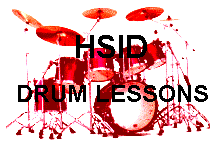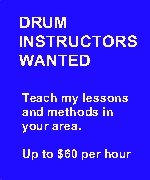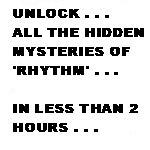 

Lesson Menu #2
Intermediate & Advanced.
Lesson Menu #3
Advanced & Ultra-Advanced.
Lesson Menu #4
Text lessons: All levels.

PRODUCTS:

GET ALL THE PRODUCTS AT ONE LOW PRICE.

SURPRISES ABOUND . . . For those with a bit of generosity
in their soul.
CLICK HERE , to see what I mean.

Intermediate & Advanced
Drummers
 Your future is waiting.
Your future is waiting.

ALL MUSICIANS
MASTER
ALL RHYTHM,
This FASCINATING WAY!
 Discover the 'LOST KEY' for Unraveling
ALL the mysteries of rhythm, and musical time.
Discover the 'LOST KEY' for Unraveling
ALL the mysteries of rhythm, and musical time.
This work
is the crowning-achievement of my 50 year career, and it's
my proudest accomplishment.
It contains the potential to help YOU change the face of modern music!
You'll love it! CLICK HERE to check it
out completely! You're in for a MAJOR surprise!
 "PRE-SCHOOL DRUMMER?
"PRE-SCHOOL DRUMMER?
YES!"
Can we teach rhythm
to pre-schoolers? YES!

This is a very short course,
designed to help adults plant the seeds of rhythm
into children of nearly any age.
CLICK HERE
 FREE ELECTRONIC BOOK BONUS (also included)
FREE ELECTRONIC BOOK BONUS (also included)
 BUSINESS OPPORTUNITY:
BUSINESS OPPORTUNITY:
MAKE BIG MONEY SELLING USED DRUMSETS!
* INSIDER HARDBALL-BUYING-TIPS AND SECRETS.
* UNIQUE RECOVERING SECRETS

Support this site and and gain an advetising bargain with the deal.
 Place a permanent ad here. Place a permanent ad here.

GET ALL THE PRODUCTS AT ONE LOW PRICE.

SURPRISES ABOUND . . . For those with a bit of generosity
in their soul.
CLICK HERE , to see what I mean.

|
|
Downloads *
Drummers Trivia *
Drummers Chat Rooms *
Rudiments *
Digital Music *
Knowledge Assessments *
TD Archives *
Drum Set Buyers Guide *
Bass-Player Jokes *
Assembling a Drum Set *
Parts of a Drum Set *
About HSID *
Video Troubleshooter
Bill Powelson's School of Drums
School of Drums
Back to the Tempo Dispatch Archives
ISSUE #19___\__\__\__\__\__________/__/__/__/__/ JULY 5, 1998
___________________________________________________
TABLE OF CONTENTS
What is in this issue?
Contents:
SPECIAL MESSAGE FOR PAID 'MAC' STUDENTS:
1. Feature Article:
DUMP THE TABS AND JAM!
2. Thoughts & Grins: 'ADVERTISING HUMOR'
________________________________________________________
|_____________________FEATURE ARTICLE____________________|
NOTE:
This months lesson may bore the more advanced 'ear' students.
But, as I promised last month, this one is for the beginners who
haven't caught-on to the thrills of jamming from the heart.
As a token of peace though . . . here is a free, hidden lesson
for all you advanced jammers. It is hard to please everyone
in one little short lesson . . . Maybe this will help keep the
advanced students happy until next month. :>)
Drum Solo Tips II.
NOW, On with this months lesson . . .
DUMP THE TABS AND JAM FROM THE HEART!
My teaching methods are based almost entirely on 'ear'
techniques. I am an old 'seat of the pants' player myself.
Though reading & writing perfection are both very important
to all drum students as a learning tool, it has become
obvious to me that the 'art' of playing drums may never
be developed properly if beginning students become too
concerned and dependent on written notation. I have seen
far too many 'would be' drummers flounder and stagnate on
a strict regimen of notation when they may have flourished
if only someone had encouraged them to put the tabs,
books and manuscripts away, then cut loose and play
what they feel from the heart!
If you are too dependent on notation . . .
HERE IS WHAT YOU NEED TO DO . . .
Get back to the website . . .
1. Memorize the 5 Basic Dancebeats.
Get those patterns to a point where you can play
each of them in your sleep! You must be able to play each
pattern rapidly and steadily (from memory) for 3 minutes
or more, non-stop.
THEN . . .
2. Turn on your radio and listen! 99% of any music you hear
will fall into one of those 5 beat categories. If you can recognize
the basic underlying beat pattern of a song, you will be able to
play that song. This means . . . With only a few hours of 'fun'
jamming (along with recordings) . . . you will quickly gain
confidence! In no time at all you will be playing song after
song by only hearing the first few bars . . . and you will be
playing by 'feel' or 'ear'.
NOTE:
Set up a sound system (radio, stereo or CD player) close
to your drum set or practice set up. The recorded music needs to
be loud enough, so that your drumming blends with the music coming
from the speakers. Sometimes headphones will help accomplish this.
.................................
The drummer does essentially two things . . . We play
beats and rolls. If students know all the common beat patterns
and all the common roll patterns . . . it becomes easy to
listen to the music. . . analyze the patterns, then jump in
playing almost identical to the drummer on the recording.
VERY IMPORTANT!!!! Think about this . . .
It is important to lend your own creativity to the songs you
play. Don't worry about copying the recorded drummer, note for note.
It is the nature of the recording medium that causes so much
confusion in the musical arts professions . . .
1. When a song is recorded in a studio it is WRONGLY
set in stone. The ideas the drummer played on that 'ONE TAKE'
become OUR idea of how that song should be played. WRONG!!!!!
Nothing could be further from the truth!
If we hear the same song being played the very next day
in concert . . . with the same musicians, it will probably be very
different. Part of the true art of playing is lost when we
strive to play everything exactly like the record every time.
It is like painting by the numbers. There is little art to that.
The pros rarely copy themselves . . . WHY SHOULD WE?
MORE CONFUSION . . . (when music is transcribed.)
Once a song has been recorded . . . someone else comes along,
listens and transcribes the parts to paper. WRONG AGAIN!
This sets everything in stone a second time. Then a student comes
along reads the transcription . . . thinking it MUST be played
THIS WAY and THIS WAY ONLY. All the true creativity and art is lost
by doing this.
To really get a grip on the artistic perspective it is
important that students should strive to IMPROVE on ALL the songs
they play. Try to OUTPLAY . . . or do things the original drummer
could have, but didn't do . . .
THE POINT:
Don't worry about playing exactly like the record. Just do
what you can do with a song . . . have fun playing along! As
you continue to do this . . . you get better at it and soon
you discover that you CAN play as the recorded drummer has played,
OR you may hear places where you can add MORE to the music than
was recorded in the studio. When you are jamming in the garage
at home there is no reason to be hemmed-in by self-imposed rules.
There are few rules in any art form.
Your own interpretation of the song
is the BEST interpretation . . .
. . . at least while you are in the garage, haha. :>)
AUDIENCES OFTEN DEMAND COPIED MUSIC . . .
When you put it in front of an un-educated audience . . .
they may demand that you play it like the record . . . SO MUCH
FOR ART, haha!
We DO often end up copying as a means to an end.
If we want to eat and pay bills regularly . . . we copy.
Otherwise . . . jamming is where it is at!
I say . . . jam to learn . . . and copy only when it
puts food on the table.
TIMING . . .
Playing along with recordings is the best 'time' training
there is. All songs are recorded in near perfect time. Just
follow the drummer on the recording . . . listen for his/her
snare backbeat and be sure to connect in unison. Keep your
backbeat in-time with the backbeat on the recording . . .
Doing this is similar to, but BETTER THAN following a metronome.
Why? Because metronomes are boring!
With music, you will gravitate to the flow and
dynamics of the real thing. You will not only sharpen your
timing skills but you will be having a GREAT time doing it.
This is where the 'FUN' factor will be found and it is where
the true drumming geniuses are created! If you are
having true fun, you will practice more frequently and for
longer periods. It works! Try it! Jam by the seat of your
pants at least one hour per day for a week. You will then
know what I am raving about and you will be hooked on it
for life!
If you really fear you are having timing problems,
Visit www.luglock.com. Read about the Tempo Ref
___________________________________________________
Here's something that may be more important that you think.
END OF TEMPO DISPATCH #19 JULY, 1998
Copyright Bill Powelson 1994 all rights reserved.
| |



